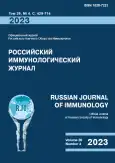Differences in the skin microbiota spectrum and parameters of local immunity in the areas of inflammation in skin diseases and healthy people
- Authors: Sennikova S.V.1, Toptygina A.P.1,2, Voropaeva E.A.1,3
-
Affiliations:
- G. Gabrichevsky Research Institute for Epidemiology and Microbiology
- Lomonosov Moscow State University
- N. Pirogov Russian National Research Medical University
- Issue: Vol 26, No 4 (2023)
- Pages: 477-484
- Section: Forum Sochi 2023
- URL: https://bakhtiniada.ru/1028-7221/article/view/253430
- DOI: https://doi.org/10.46235/1028-7221-13086-DIT
- ID: 253430
Cite item
Full Text
Abstract
Alteration of microbiota composition is a trigger, and, sometimes, an etiological factor in the development of chronic skin diseases, e.g., psoriasis or eczema. Recognition of microflora by keratinocytes and immune cells leads to the production of antimicrobial peptides, chemokines and growth factors, which contribute to the differentiation of T lymphocytes to autoaggressive effector cells of Th1, Th17 and Th22 types that implement autoimmune inflammation in the psoriatic plaque. The aim of our work was to study the differences in the skin microbiota spectrum and the parameters of local immunity in capillary blood taken near the focus of inflammation in patients with autoimmune (psoriasis) and allergic (eczema) diseases compared with the parameters of healthy people. 24 patients with psoriasis (group 1), 20 patients with eczema (group 2) and 20 healthy adults (group 3) were examined. Biological materials were taken, i.e., the smears taken with sterile dry swab to the Amies transport medium with activated carbon, and capillary blood was taken in 2 microvets, 200 µL each) from the foci of inflammation on affected skin from the hands of patients, or from the fingers of healthy people. Inoculations of diagnostic media, microscopy with Gram staining and microbial identification were performed in a microbiological analyzer. Immunophenotyping of 22 subsets of mononuclear cells was performed by four-color staining of capillary blood with erythrocyte lysis and evaluation of subsets by a flow cytometer. Cytokines in blood plasma were determined by multiplex method. The spectrum of hand skin microflora of the group 3 was more diverse in the species composition. In patients with psoriasis and eczema, the coccal flora dominated, with a shift towards pathobionts in the microbiota spectrum. Activation of T and B cells, production of pro-inflammatory cytokines, IL-23/IL-17/IL-22 axis cytokines and cytokines – markers of epithelial cell damage (IL-25 and IL-33), as well as anti-inflammatory factors insufficiency were detected. Differences in changing parameters of the local immune status in patients with autoimmune (psoriasis) and allergic (eczema) diseases were revealed, thus reflecting the distinct features of immunopathogenesis in these diseases.
Keywords
Full Text
##article.viewOnOriginalSite##About the authors
S. V. Sennikova
G. Gabrichevsky Research Institute for Epidemiology and Microbiology
Email: drsennikova@mail.ru
Postgraduate Student, Laboratory of Cytokines, G. Gabrichevsky Research Institute for Epidemiology and Microbiology
Russian Federation, MoscowAnna P. Toptygina
G. Gabrichevsky Research Institute for Epidemiology and Microbiology; Lomonosov Moscow State University
Author for correspondence.
Email: toptyginaanna@rambler.ru
PhD, MD (Medicine), Professor, Chief Research Associate, Head of Laboratory of Cytokines, G. Gabrichevsky Research Institute for Epidemiology and Microbiology; Professor, Department of Immunology, Faculty of Biology, Lomonosov Moscow State University
Russian Federation, Moscow; MoscowE. A. Voropaeva
G. Gabrichevsky Research Institute for Epidemiology and Microbiology; N. Pirogov Russian National Research Medical University
Email: voropaeva@gabrich.ru
PhD, MD (Biology), Chief Research Associate, Head of the Medical Biotechnology Department, G. Gabrichevsky Research Institute for Epidemiology and Microbiology; Professor, Department of Microbiology and Virology, Faculty of Biology, N. Pirogov Russian National Research Medical University
Russian Federation, Moscow; MoscowReferences
- Теличко И.Н., Белоусова И.Э., Хайрутдинов В.Р. Дерматовенерология. Учебник. 3-е изд., перераб. и доп. М.: ГЭОТАР-Медиа, 2016. 432 с. [Telichko I.N., Belousova I.E., Khairutdinov V.R. Dermatovenereology. Textbook. 3rd ed., rev. and suppl.]. Moscow: GEOTAR-Media, 2016. 432 p.
- Bodoor K., Al-Qarqaz F., Heis L.A., Alfaqih M.A., Oweis A.O., Almomani R., Obeidat M.A. IL-33/13 Axis and IL-4/31 axis play distinct roles in inflammatory process and itch in psoriasis and atopic dermatitis. Clin. Cosmet. Investig. Dermatol. 2020, Vol. 13, pp. 419-424.
- Buchau A.S., Gallo R.L. Innate immunity and antimicrobial defense systems in psoriasis. Clin. Dermatol. 2007, Vol. 25, no. 6, pp. 616-624.
- Chang H.W., Yan D., Singh R., Liu J., Lu X., Ucmak D., Lee K., Afifi L., Fadrosh D., Leech J., Vasquez K.S., Lowe M.M., Rosenblum M.D., Scharschmidt T., Lynch S.V., Liao W. Alteration of the cutaneous microbiome in psoriasis and potential role in Th17 polarization. Microbiome, 2018, Vol. 6, 154. doi: 10.1186/s40168-018-0533-1.
- Dainichi T., Kitoh A., Otsuka A., Nakajima S., Nomura T., Kaplan D.H., Kabashima K. The epithelial immune microenvironment (EIME) in atopic dermatitis and psoriasis. Nat. Immunol., 2018, Vol. 19, no. 12, pp. 1286-1298.
- Goodman W.A., Cooper K.D., McCormick T.S. Regulation generation: the suppressive functions of human regulatory T cells. Crit. Rev. Immunol., 2012, Vol. 32, no. 1, pp. 65-79.
- Grice E.A., Kong H.H., Conlan S., Deming C.B., Davis J., Young A.C., Bouffard G.G., Blakesley R.W., Murray P.R., Green E.D., Turner M.L., Segre J.A. Topographical and temporal diversity of the human skin microbiome. Science, 2009, Vol. 324, no. 5931, pp. 1190-1192.
- Langan E.A., Griffiths C.E.M., Solbach W., Knobloch J.K., Zillikens D., Thaci D. The role of the microbiome in psoriasis: moving from disease description to treatment selection? Br. J. Dermatol., 2018, Vol. 178, no. 5, pp. 1020-1027.
- Nakamura Y., Oscherwitz J., Cease K.B., Chan S.M., Muñoz-Planillo R., Hasegawa M., Villaruz A.E., Cheung G.Y., McGavin M.J., Travers J.B., Otto M., Inohara N., Núñez G. Staphylococcus delta-toxin induces allergic skin disease by activating mast cells. Nature, 2013, Vol. 503, no. 7476, pp. 397-401.
- Rendon A., Schäkel K. Psoriasis pathogenesis and treatment. Int. J. Mol. Sci., 2019, Vol. 20, 1475. doi: 10.3390/ijms20061475.
- Yerushalmi M., Elalouf O., Anderson M., Chandran V. The skin microbiome in psoriatic disease: a systematic review and critical appraisal. J. Trans. Autoimmun., 2019, Vol. 2, 100009. doi: 10.1016/j.jtauto.2019.100009.
- Zheng Y., Hunt R.L., Villaruz A.E., Fisher E.L., Liu R., Liu Q., Cheung G.Y.C., Li M., Otto M. Commensal Staphylococcus epidermidis contributes to skin barrier homeostasis by generating protective сeramides. Cell Host Microbe, 2022, Vol. 30, pp. 301-313.
Supplementary files







